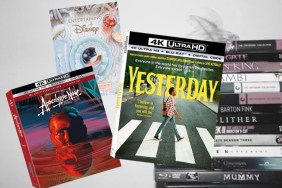Like the cat who keeps dropping a dead mice at your doorstep, the new horror drama Maggie presents us with quite the conundrum. “Well done,” you have to admit. “But what the hell am I supposed to do with it?”
Arnold Schwarzenegger stars in Maggie as Wade, the father of a teenaged girl who has been bitten by a zombie. The zombie outbreak is indeed upon us, it seems, but has not yet reached apocalyptic proportions. The infected are cared for or quarantined until they are no longer in control of their appetites, and then swiftly disposed of. That is the journey Wade himself must make with his daughter. There is no cure in sight for Maggie (Abigail Breslin), so he stays by her side until the bitter end.
That’s about it, really. In a genre practically defined by fatalism, Maggie probably reigns supreme. It is at its heart the story of a dying girl and her loving father, played with stalwart protectiveness by Schwarzenegger. For once, this mountain of a man isn’t a heroic ideal, but rather a paternal ideal, standing up for his daughter even when rationality demands otherwise, and ultimately uncertain whether he really has the guts to put Maggie out of her misery.

And yet that sort of suspense – can he or can’t he? – is a little too thin to hang an entire motion picture on it. What’s more, it’s depressing as all hell. Of course it should be, since the inevitable death of your child in just a few short days is anything but a picnic. But one has to wonder whether using zombies as an allegory for euthanizing your child after she contracts an incurable disease was actually worth all the trouble, if all the filmmakers were ever going to do is play the drama straight.
Like all of the best monsters, zombies can be used to tell meaningful stories that explore many different and socially relevant topics. Capitalism, racism, fascism, overpopulation, global warming and even pet ownership have all been livened up by the tropes that come part and parcel with a living dead movie. But aside from minor asides, and the threat of “quarantine” camps that are little more than a place to die, Maggie doesn’t use the idea of a zombie outbreak as anything more than a window dressing. It is a drama about a dying girl. Cut out any reference to the living dead and Maggie would be exactly the same film, maybe even a better one.
One has to wonder if the mashing up the zombie and dying child melodrama genres serves any purpose other than to trick mainstream audiences into watching a movie that will break their hearts. Because if the point was to prove that dying of a zombie virus would be just as tragic as dying of any other disease, it would be an inert exercise. Maggie is anything but inert, thank goodness. The performances are solid and the cinematography is impressively evocative, but it’s so laser focused being tragic that it never takes advantage of its many opportunities to become so much more. Maggie is too straightforward to be an engaging genre movie, and too broadly conceived to be as effective as a realistic drama about terminal illness.
Well done, in other words. But what the hell are we supposed to do with it?

William Bibbiani is the editor of CraveOnline’s Film Channel and the host of The B-Movies Podcast and The Blue Movies Podcast. Follow him on Twitter at @WilliamBibbiani.








